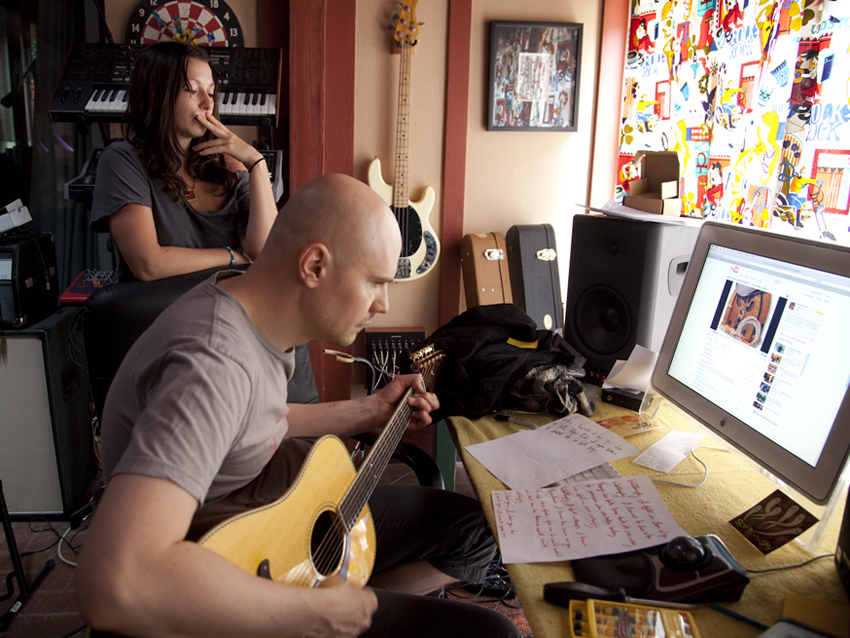
Exclusive: Billy Corgan and Sierra Swan talk new album Good Soldier
It’s been over a decade since Billy Corgan has produced an album for another artist. Not that he’s been lacking for offers: “If I get approached 20 times to produce somebody, I probably say no 20 times,” Corgan says. “Generally speaking, I don’t like producing. I feel like artists deserve their own version of record production, and my version is pretty particular.”
Last year, however, Corgan eased back into the producer’s chair to work with singer-songwriter Sierra Swan, whom he met in 2009 through mutual friends while he was assisting Courtney Love on Hole’s last album, Nobody’s Daughter. “There were a lot of reasons for me deciding to work with Sierra,” Corgan explains, “but one of the biggest is her sheer talent. Quite simply, she has one of the greatest voices I’ve ever heard.”
Swan’s new album, Good Soldier (to be released February 25), is a rarity in current-day rock, a triumph of highly personal songwriting and minimalist sonic architecture that manages to connect with listeners without telegraphing emotions or overstating musical cues. If this were the work of a debut artist, we would be heralding the arrival of an exciting new talent, but this isn’t Swan’s first trip to the rodeo: The daughter of famed country/rockabilly singer-songwriter, Billy Swan, she was briefly a member of the electronic duo Dollshead before signing a solo deal with Atlantic. Dropped by the label, she then signed with Interscope and released the 2006 album Ladyland. Two independently released albums and an EP followed before her collaboration with Corgan.
“Even though I’ve made records before, I was scared to death to work with Billy,” Swan explains with a laugh. “That sounds funny because he’s a friend. I just remember going to Chicago and feeling very intimidated. But that feeling went away just as quickly when I realized, ‘No, wait. He’s here to hold me up. He’s going to help me get this right.’ I think because he’s an artist himself, he knew how I felt. A lot of producers try to understand, but Billy really does because he’s been there.”
In an exclusive interview with MusicRadar, Corgan and Swan discuss their studio collaboration, the short list of guitars and gear they used, Swan's recent sabbatical from music making, and how the two feel about today's music business.
Billy, I know that you have some strong feelings about record labels. Would you describe Sierra’s history with the industry as being somewhat typical?
Billy Corgan: “You know, the major labels can hold down talent. It happens time and time again. Sierra’s one of those artists who, when they don’t know what to do with you, they kind of throw you into the normal meat grinder, and then they’re surprised when it doesn’t work.
“You can probably find these tales from every generation, but in the music of my generation, they take the willing and the mediocre and they push them up, and then they take the super-talented and they push them down. To me, it’s criminal that Sierra hasn’t been able to show what she can do. But she had to get to this place where she gave up one bad dream and found herself in a new place, and that’s the dream she’s in now.”
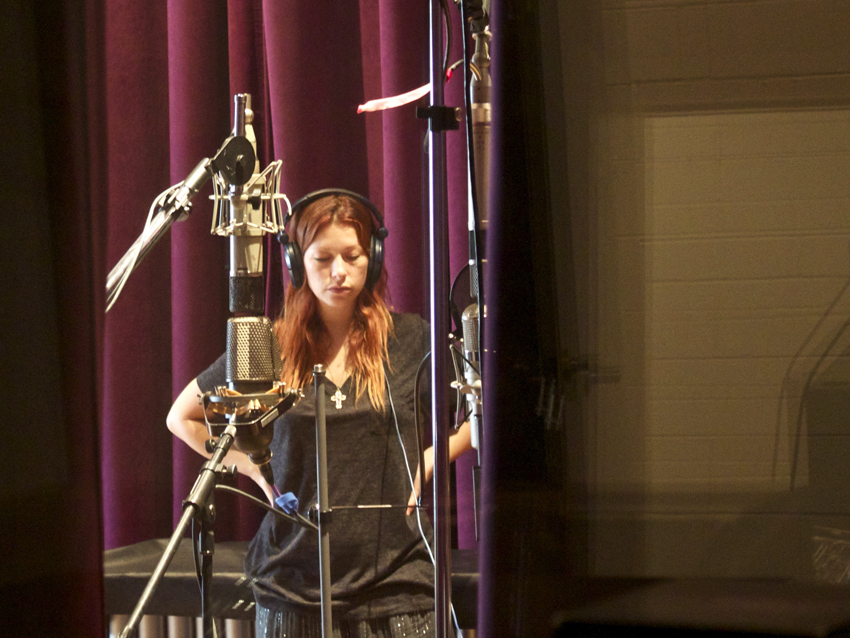
Exclusive: Billy Corgan and Sierra Swan talk new album Good Soldier
Now, Sierra, you took some time off after you had your first child [Jasper Thomas Swan-Garton, age three], and you’re expecting your second this year. Has motherhood changed your songwriting?
Sierra Swan: [Laughs] “There’s nothing more inspiring than having kids. You think you have problems, but you don’t. What was surprising was how writing came back to me naturally, and I realized that I had a lot to say. Maybe I wasn’t trying so hard because I was thinking about other more ‘important’ things. I let myself get out of the way and the songs flowed.
“I think you can be consciously creating when you don’t even know it, but sometimes you have to sit down and catch the art, catch the dreams. Becoming a mother changed me as a person, but it also changed me as a songwriter. The whole experience made me ready to do this with Billy.”
Corgan: “Sierra would play me her new songs, and I thought they were fantastic, so I would keep encouraging her to write more and more. Then she played me another batch, and they were even better. Finally I just said, ‘OK, I’ve got to produce you.’ And she was like, ‘You’re kidding, right? Because I know you don’t do that.’ But I was serious. There was something she was onto that I just couldn’t deny.”
“Sierra’s been through the whole major-label thing – it just never worked out for her. My own personal opinion is that she would always default into the standard singer-songwriter production. There’s kind of like this LA style, if that makes any sense. I don’t want to name names, but it’s got a nice, cozy vibe, a little bit of guitar, but it always winds up being a little middle of the road. What gets sacrificed a lot of times is the songwriter’s edge.
“Sierra’s work was always put under the wrong microscope and expected to do what she’s not designed to do as a vocalist. So there would be fleeting moments of brilliance mixed in with a lot of middling moments. It’s like taking a great guitarist, somebody like Steve Vai, and asking him to only play rhythm guitar.
“To me, Sierra had an edge, but she captured it with simplicity. Big, sophisticated production had always blunted her in the past. In my mind, she belongs with the great crooners like June Christy or Frank Sinatra. Her voice is her instrument like Charlie Parker’s saxophone is his instrument – that’s what you’re listening for. How they riff over everything is what’s so interesting.
“When I heard Sierra’s demos – just acoustic and voice and a little bit of guitar work – I thought, ‘That’s it. That’s what she’s been looking for.’ Again, in production, that would always get blunted. I know how she thinks, and I was worried that she wouldn’t let it be raw, that she would somehow push me some other way. I told her, ‘I’ll produce you if we can do what you’re doing already but just the better version.’ And she agreed to that.”
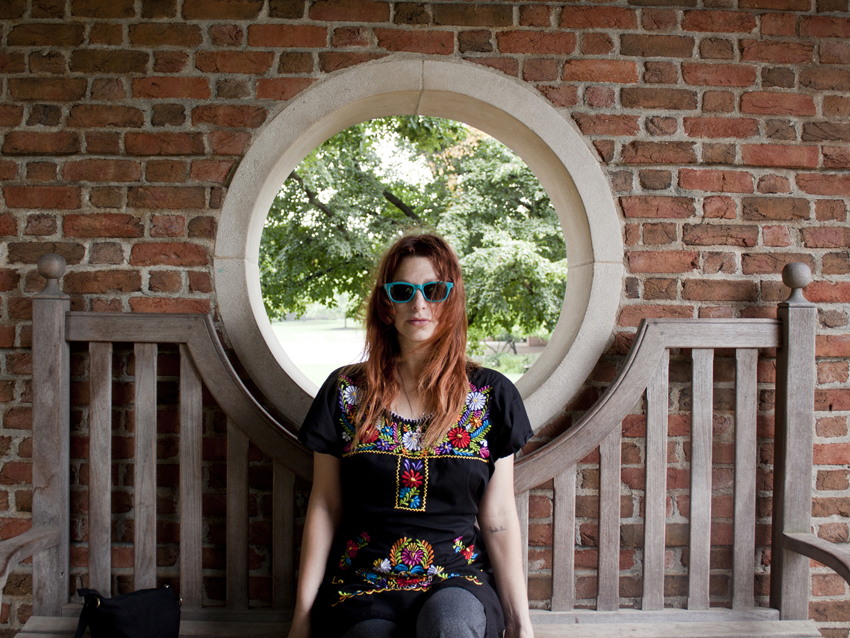
Exclusive: Billy Corgan and Sierra Swan talk new album Good Soldier
Sierra, I’m curious – how do you think you manage to write lyrics that are deeply autobiographical but aren’t precious to the point where others can’t relate?
Swan: “Being brought up by musicians and being around them so much, I think songwriting just seeped into me. My dad was in Kris Kristofferson’s band and then toured on his own. I heard Kris' music for two months straight – I was hearing it backstage on the couch. That stuff sinks in. The lyrics and the soul that you have to draw out and connect to – that’s what Kris is all about that; that’s what my dad is all about. So it’s not like I studied songwriters and said, ‘I’m going to be like whoever.’ It’s just the only way I know.
“Phil Everly was a really good friend of my dad’s, and I was lucky enough to write some songs with Phil five months ago, before he died. I had no idea how sick he was until his son called me the day he died. It was a total shock. But Phil is another one of those writers, people who reach into their heart to express something very, very personal. It’s not the kind of thing a lot of teens will listen to right now, but it’s stuff that means a lot over time.”
Like Billy was saying, the downside to not chasing the charts is that the industry doesn’t know what to do with you. But there can be your own special upside if it all works.
Swan: “And that’s sort of all you can work towards; it’s ultimately all that matters. I mean, it’s tough to do this financially. People have to want something in order to want to help you. There has to be a pay-off, a reward, and I get that. But that’s the thing about Billy and his contributions: It didn’t involve money or ego; it was simply, ‘I like what you’re doing and I want to help.’ In this day and age, that’s pretty rare. He was just being supportive. There was really nothing he was going to gain from it.”
In regards to your earlier records, what were you looking to do differently with Billy?
Swan: “It’s funny: Billy and I have always had something of a hate-love relationship. He likes to joke about me having such strong opinions, although, of course, so does he. He would always say, ‘You watch – one day I’m gonna produce you.’ And I would be like, ‘No. Way.’ [Laughs] But he knew that I had to go through my musician bullshit and run myself into the ground before I could ask for help.
“Letting my ego stuff go was important. I had to be willing to let go of my control issues. Billy has a great, great ear for what works and what should happen naturally. That was the main thing, really – allowing him to see what the songs needed, what they didn’t, and to let him tell me without putting up a fight.”
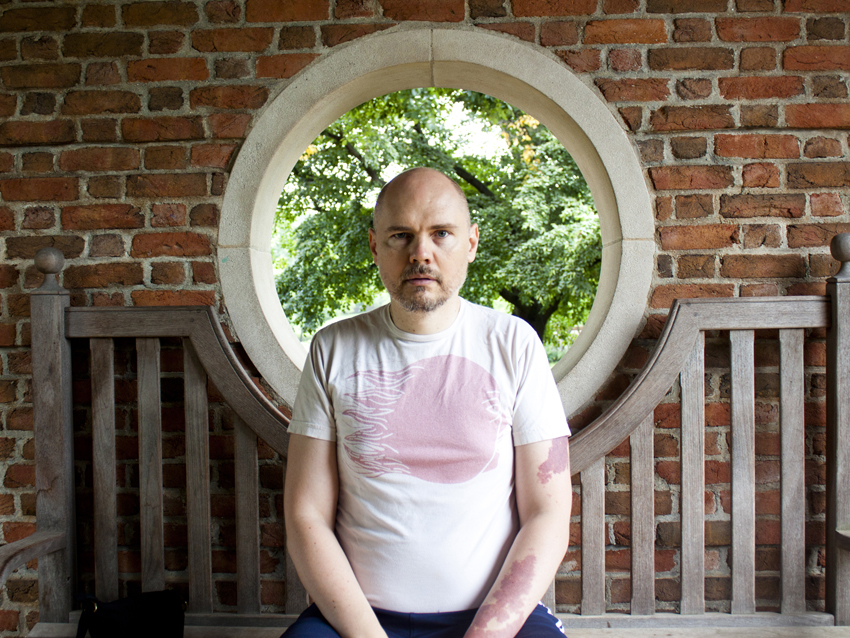
Exclusive: Billy Corgan and Sierra Swan talk new album Good Soldier
Billy, how did you work with Sierra’s demos in deciding what instrumentation the songs needed?
Corgan: “She encouraged me to do whatever I thought was best. It’s not that she wasn’t interested; she was actually very, very engaged. Much like me, she grew up with a musical tradition, so we connect on that. Having fathers who are both professional musicians really brings a different air on how to approach music that’s different from maybe somebody who grew up wanting to be a musician. So Sierra deferred that to me, not out of weakness but more from ‘I’ve done my part. Now you do yours.’
“The demos showed me what to do. I wanted to retain the blunt power and get the most out of what was already there. In some cases, if I thought a song was going to be acoustic with no backing, she would put some drums on it – I’d come in, hear it, and I thought it worked. Other times, she put drums on songs and I thought something got lost.”
It’s interesting: You say that your version of production is very particular, but to my ears, what you did on Sierra’s album is quite invisible. It certainly doesn’t sound like “Billy Corgan of The Smashing Pumpkins.”
Corgan: “A lot of the guitar playing and bass playing is Sierra.
Swan: “Billy did play on the record too, but he didn’t play like people probably expect he would; he didn’t sound like The Smashing Pumpkins. Maybe on The Day, when that distortion comes into the chorus, that’s where you hear it and go, ‘Oh, yeah, that sounds like him.’ He kept his instrumental parts low-key.”
Corgan: “Again, I defer to Sierra’s wisdom. My job was to enhance what she was doing without putting myself overtop it or taking away anything. That’s why I thought I could produce it. See, most artists, whether they’re conscious of it or not – and I include myself in this category – operate from a place of weakness. Most great rock ‘n’ roll comes from a desperation – a need to communicate or a new breakthrough.
“Over the last 20 years, though, we’ve seen rock ‘n’ roll fall into these comfortable zones – comfortable chord changes, comfortable styles of production. There’s the snare sound, there’s the bass drum sound. It’s very hard for a lot of musicians to get out of those comfort zones, and being an artist myself, I know it’s not a matter of just saying, ‘Let’s be radical.’”
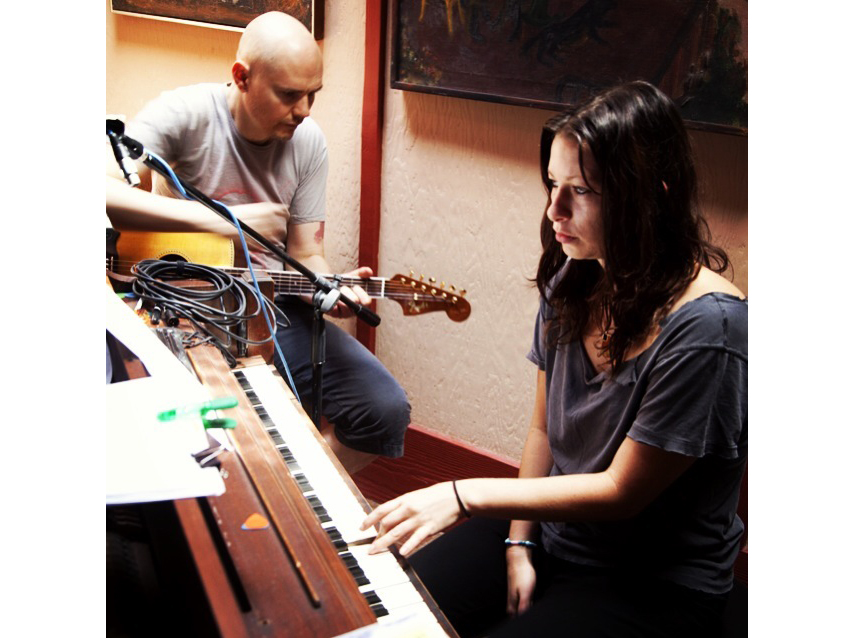
Exclusive: Billy Corgan and Sierra Swan talk new album Good Soldier
What were the main instruments that were used on the album?
Corgan: The album has a Telecaster, a Bozo acoustic, an old Selmer amp, a Minimoog, a Fender P Bass and a little bit of drums here and there.”
Swan: “Going through Billy’s equipment was such a fun experience. He’s got everything! [Laughs] And I just loved that acoustic. But we really didn't use a lot of things, even though he's got a ton of instruments and gear."
Corgan: “I’ll share something that my Flood – my friend and a great producer whom I've worked with – told me, and it’s something that Brian Eno had told him, so I’m paraphrasing: ‘You should only go into the studio with one keyboard.’ The idea being that you’ll be forced to get inside that keyboard rather than half-getting something out of 10 keyboards. I went into this with a slightly similar approach, that we’re going to get a lot with a little.
“And the fact is, Sierra’s a great musician. She’s one of those people like Bob Dylan. People talk about Bob Dylan, but they don’t talk about what a great musician he is. If you listened to early Dylan and he’s fingerpicking, he’s really good. Sierra is like that: She’s as good a musician as she chooses to be. If she chooses to play guitar, she’ll blow you away. I don’t have that – I have to really work at it.” [Laughs]
Sierra, the way you use your voice is pretty striking. On the song Emotional, you’re your own choir, but it doesn’t come of as a pretentious, cheesy effect.
Swan: “I know what you mean. I think a lot of it’s from my dad. He pushed a lot of real singers on me. It wasn’t about who was popular – that just wasn’t how I grew up. He showed me who real singers were and what they sounded like – people like Patsy Cline. I would listen to the inflections in people’s voices, the intentions, the laybacks, the way they would power through – all of those things work with lyrics. A lot of singers don’t try to put that stuff together, I think.”
Talk to me about the song Little Shoes. I’ve never heard a lullaby turned into an alternative-rock torch ballad before.
Swan: [Laughs] “That’s great! I love that you say that because that was sort of the plan all along. I hadn’t heard one of those before myself, so I was like, ‘OK, let’s try it.’ I totally wrote it trying to wake my son up from a nap. He actually doesn’t like it when I play guitar, probably because he thinks it’s taking me away from my paying attention to him. The song just happened. Recording it, yeah, I wanted it to sound exactly how you said. That’s great.”
Corgan: "There’s a certain amount of maturity that’s Sierra's gained, and I’m sure motherhood has played into this. She was in a tough spot with this whole thing – no label, the Kickstarter thing, trying to generate the resources. She’s very much on her own in the truest sense, and this is very much a DIY thing. But I told her, ‘You can open this up into 20, 30 more years of music. It’s there if you want it.’
"This can be her breakthrough, and hopefully this is the music business we’re going to for people Sierra. Her life and death as a musician shouldn’t come down to popping out a dumb single to complete with the other dumb single to complete with the other dumb single."
Sierra Swan's album Good Soldier can be purchased at her official website.
Joe is a freelance journalist who has, over the past few decades, interviewed hundreds of guitarists for Guitar World, Guitar Player, MusicRadar and Classic Rock. He is also a former editor of Guitar World, contributing writer for Guitar Aficionado and VP of A&R for Island Records. He’s an enthusiastic guitarist, but he’s nowhere near the likes of the people he interviews. Surprisingly, his skills are more suited to the drums. If you need a drummer for your Beatles tribute band, look him up.
